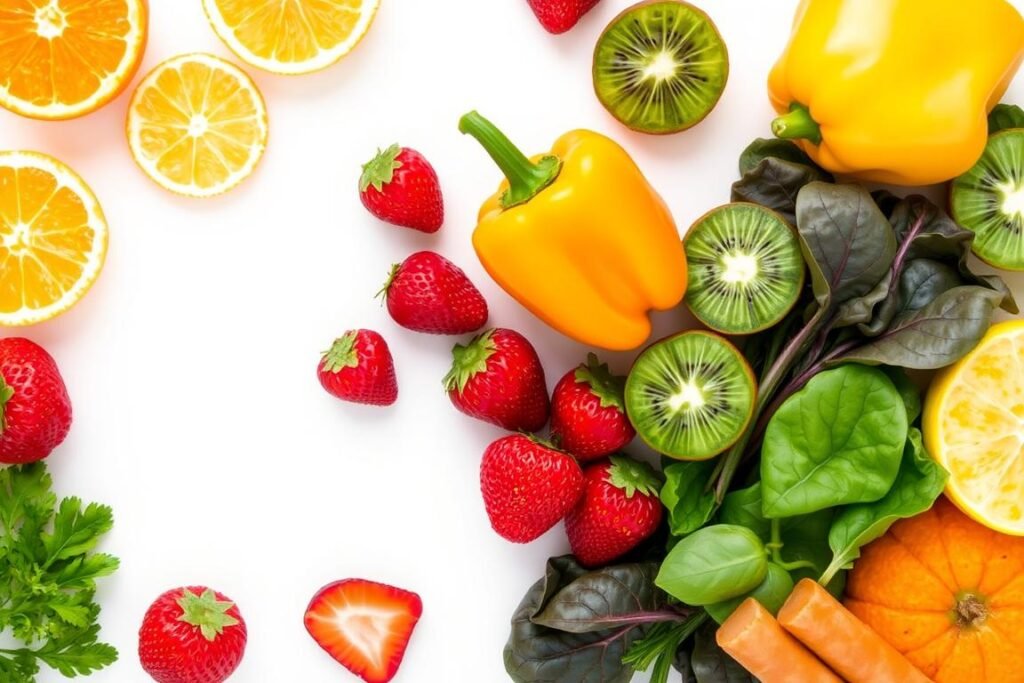
An MCL sprain can sideline you for weeks, but proper nutrition can significantly accelerate your healing process. While physical therapy and rest are crucial components of recovery, the foods you eat play an equally important role in repairing damaged tissue, reducing inflammation, and rebuilding strength. This comprehensive guide explores evidence-based nutrition strategies specifically designed to support MCL sprain recovery and get you back to your active lifestyle faster.
The medial collateral ligament (MCL) connects the femur to the tibia on the inner side of the knee
How Nutrition Impacts MCL Sprain Healing
When you suffer an MCL sprain, your body immediately initiates a complex healing process. This process involves inflammation (a necessary first step), followed by tissue repair and remodeling. Each of these phases requires specific nutrients to function optimally. Without proper nutritional support, recovery can be significantly delayed.
The Science Behind Tissue Repair
MCL healing relies heavily on collagen synthesis—the process of creating new connective tissue to replace damaged ligament fibers. This process requires specific amino acids from protein, vitamin C as a cofactor, and various minerals that act as enzymatic catalysts. Research shows that nutritional deficiencies can impair collagen formation, leading to weaker tissue repair and prolonged recovery times.
Managing Inflammation Through Diet
While some inflammation is necessary for healing, excessive or prolonged inflammation can delay recovery. Your diet can either fuel or fight inflammation. Anti-inflammatory nutrients help control the inflammatory response, ensuring it does its job without causing additional damage. This balance is crucial for optimal MCL recovery.
7 Critical Nutrients for MCL Repair
Specific nutrients play essential roles in ligament healing. Incorporating these into your diet can create the optimal internal environment for MCL recovery.
Why Protein is Your MCL’s Best Friend
Protein provides the building blocks (amino acids) necessary for tissue repair and regeneration. After an MCL sprain, your body needs additional protein to rebuild the damaged ligament fibers and prevent muscle loss during reduced activity.
Research suggests consuming 1.6-2.0 grams of protein per kilogram of body weight daily during ligament recovery to optimize healing and maintain muscle mass.
Vitamin C: The Collagen Catalyst
Vitamin C is essential for collagen synthesis—the process that rebuilds your damaged MCL. Without adequate vitamin C, collagen formation is impaired, leading to weaker tissue repair and delayed healing.
Zinc: The Wound-Healing Mineral
Zinc is involved in over 300 enzymatic reactions in the body, including many related to tissue repair and protein synthesis. It plays a crucial role in every stage of the wound healing process.
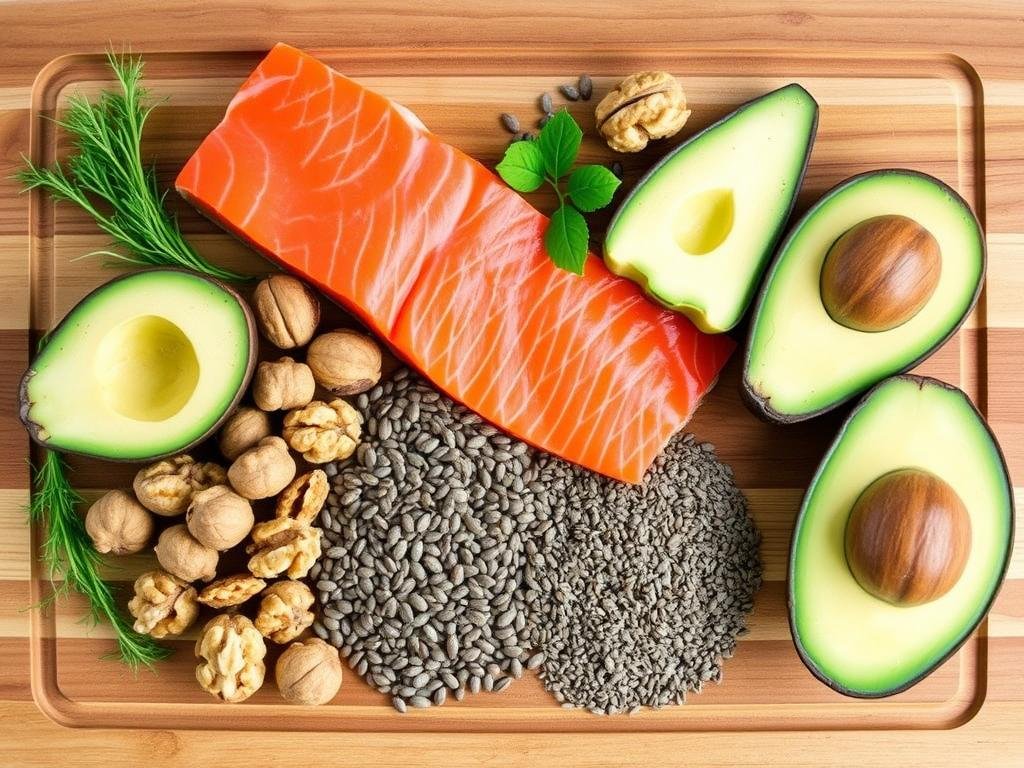
Omega-3 Fatty Acids: Nature’s Anti-inflammatories
Omega-3 fatty acids help regulate inflammation, ensuring the healing process proceeds efficiently without excessive inflammatory damage. They also support cell membrane health and may enhance protein synthesis.
Vitamin D and Calcium: The Bone-Supporting Duo
While primarily known for bone health, vitamin D and calcium also support soft tissue healing. Vitamin D has anti-inflammatory properties and helps regulate immune function during recovery.
Vitamin A: The Overlooked Recovery Nutrient
Vitamin A supports early inflammation during the healing process and later helps with tissue remodeling. It’s essential for proper immune function and cellular communication during recovery.
Bromelain: The Natural Anti-inflammatory Enzyme
This enzyme found in pineapple has been shown to reduce swelling, bruising, and pain in soft tissue injuries. It works by breaking down inflammatory proteins at the injury site.
3 Actionable Dietary Tips for Faster MCL Recovery
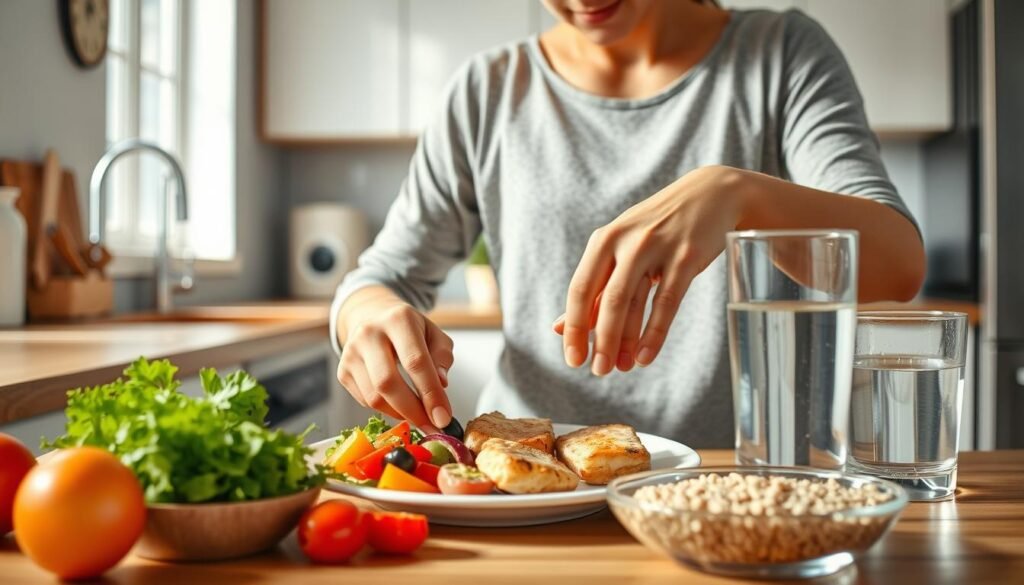
Optimal Protein Timing and Distribution
How you distribute protein throughout the day matters as much as the total amount. Research shows that spreading protein intake evenly across meals maximizes muscle protein synthesis and tissue repair.
Aim for 20-30g of high-quality protein every 3-4 hours throughout the day, including a protein-rich snack before bed to support overnight recovery.
Strategic Hydration for Tissue Healing
Proper hydration is crucial for nutrient transport, waste removal, and maintaining the viscosity of synovial fluid around the injured MCL. Dehydration can significantly impair the healing process.
The Inflammation-Fighting Shopping List
Creating an anti-inflammatory eating pattern is essential for controlling excessive inflammation during MCL recovery. This approach focuses on whole foods rich in antioxidants and natural anti-inflammatory compounds.
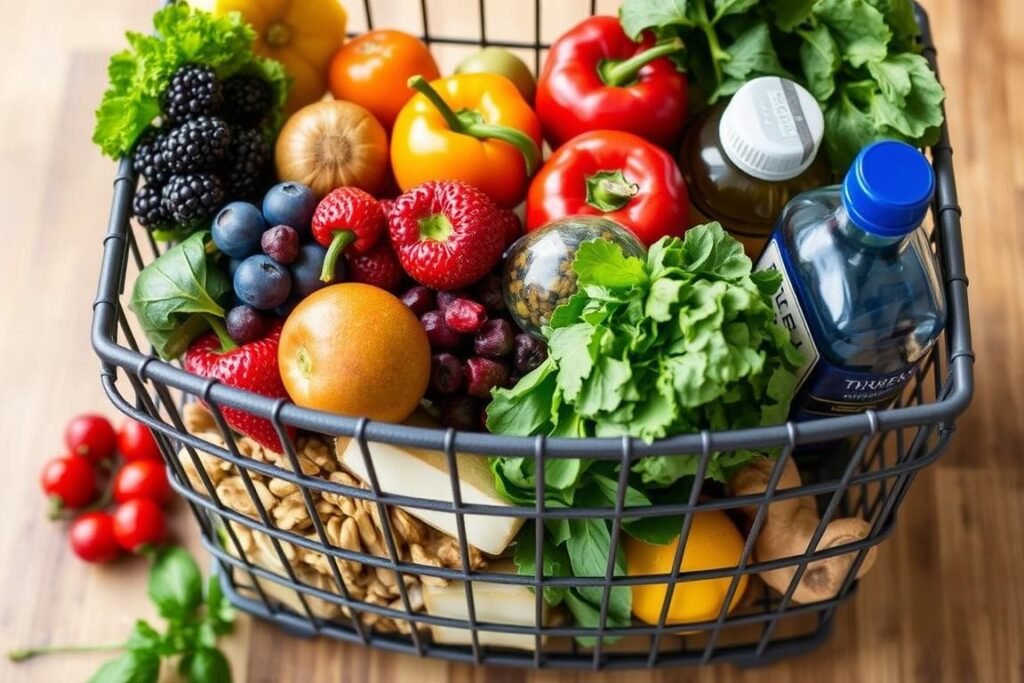
Prioritize These Foods:
Meal Planning Strategy:
3 Foods and Supplements to Avoid During MCL Recovery
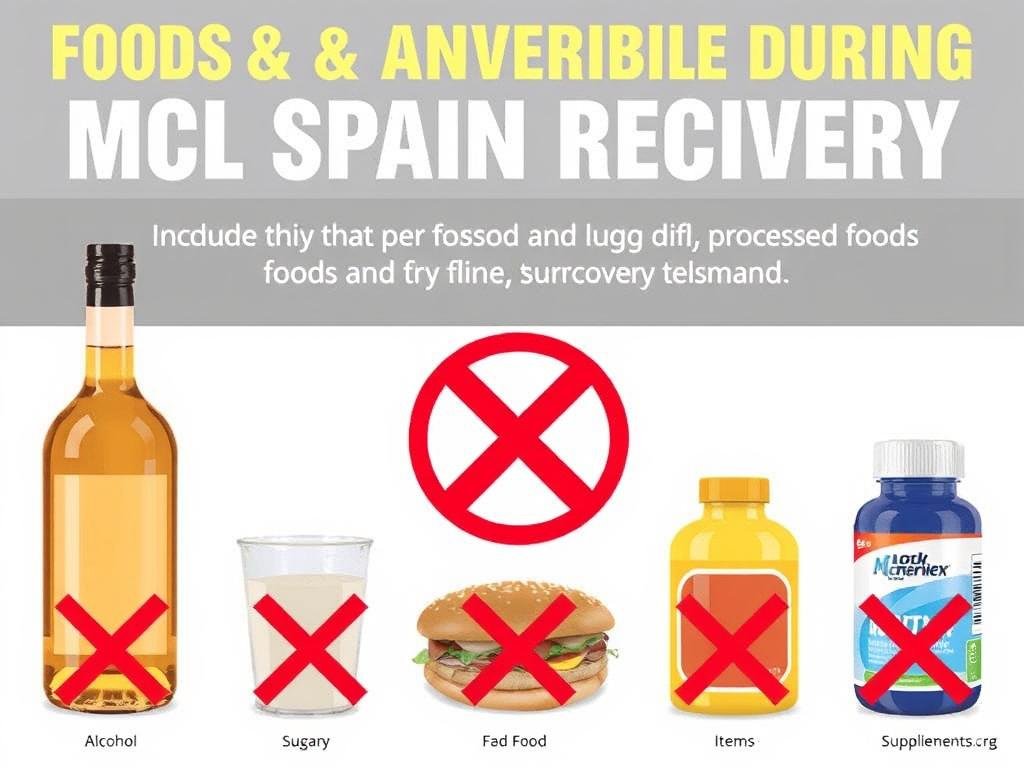
Alcohol: The Recovery Saboteur
Even moderate alcohol consumption can significantly impair the healing process. Alcohol disrupts protein synthesis, impairs sleep quality, promotes dehydration, and can increase inflammation—all detrimental to MCL recovery.
Research shows that alcohol consumption can reduce muscle protein synthesis by up to 30% and impair the body’s inflammatory response, potentially extending recovery time by weeks.
Processed Sugars and Refined Carbohydrates
Foods high in refined sugars trigger inflammatory responses that can interfere with healing. They also displace nutrient-dense foods from your diet and can lead to weight gain during reduced activity.
Certain Supplements and Medications
Some common supplements and medications can interfere with the natural healing process or interact with prescribed treatments for your MCL sprain.
Always consult with your healthcare provider before starting or stopping any supplements during MCL recovery, as individual needs vary based on injury severity, overall health, and concurrent treatments.
1-Day Sample Meal Plan for MCL Sprain Recovery
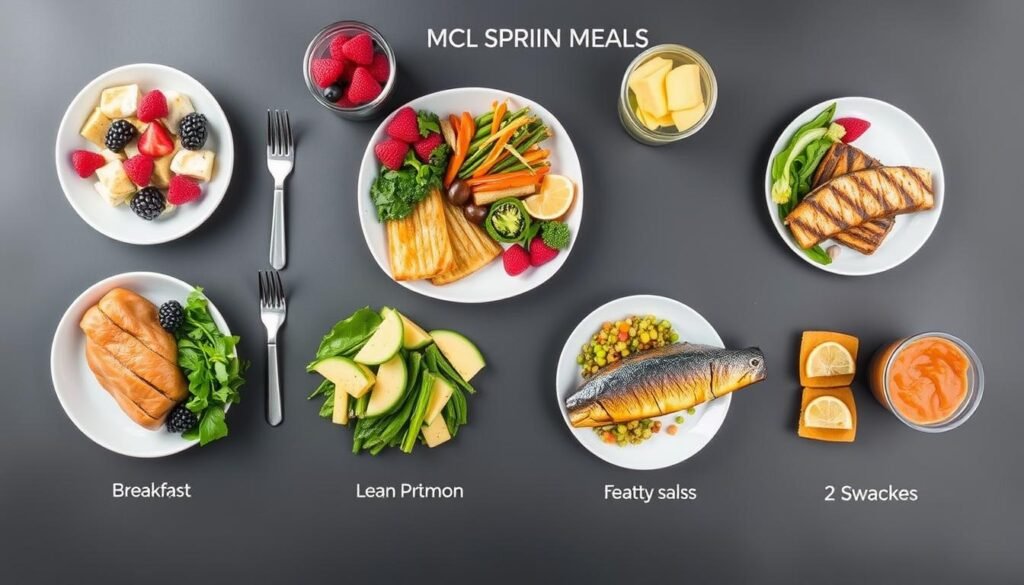
This meal plan is designed to provide optimal nutrients for MCL healing while maintaining energy balance during reduced activity. It delivers approximately 1,800-2,000 calories with balanced macronutrients and emphasizes anti-inflammatory foods.
Breakfast: Anti-inflammatory Protein Bowl
Recovery benefits: Provides 25g protein, omega-3 fatty acids, antioxidants, and fiber to control inflammation and support tissue repair.
Mid-Morning Snack: Collagen-Supporting Smoothie
Recovery benefits: Delivers collagen precursors, vitamin C, bromelain, and additional protein to support ligament repair.
Lunch: Salmon and Quinoa Bowl
Recovery benefits: Rich in omega-3 fatty acids, complete protein, zinc, and antioxidants to reduce inflammation and support tissue healing.
Afternoon Snack: Protein-Rich Recovery Plate
Recovery benefits: Provides sustained energy, additional protein, vitamin A, and healthy fats to support afternoon recovery.
Dinner: Anti-inflammatory Chicken and Sweet Potato
Recovery benefits: Delivers lean protein, vitamin A, vitamin K, and antioxidants to support overnight tissue repair.
Before Bed: Tart Cherry Recovery Drink
Recovery benefits: Provides slow-digesting protein for overnight recovery and tart cherry compounds that may reduce pain and inflammation.
Hydration reminder: Drink at least 8 ounces of water with each meal and snack, plus additional water throughout the day for a total of 12-16 cups.
Supplement Considerations for MCL Recovery
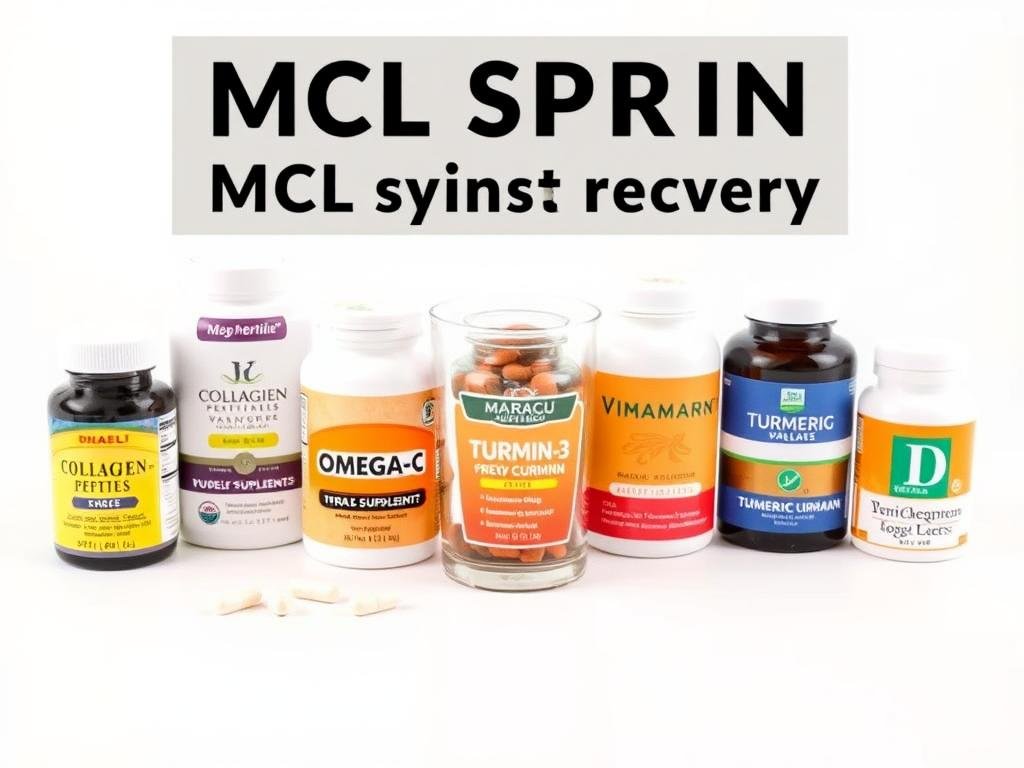
While whole foods should form the foundation of your recovery nutrition plan, certain supplements may provide additional support. Always consult with your healthcare provider before starting any supplement regimen.
Potentially Beneficial Supplements
Supplement Safety Guidelines
Putting It All Together: Your MCL Recovery Nutrition Plan
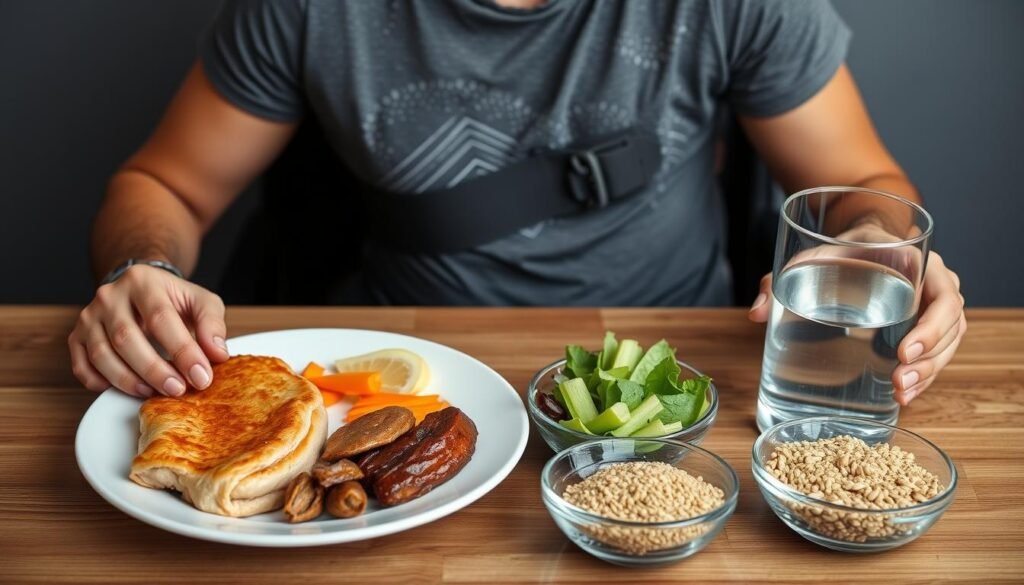
Recovering from an MCL sprain requires a comprehensive approach that includes proper rest, physical therapy, and optimal nutrition. By strategically incorporating the nutrients and dietary strategies outlined in this guide, you can create an internal environment that supports faster and more complete healing.
Remember that individual nutritional needs may vary based on injury severity, overall health status, activity level, and concurrent treatments. Working with healthcare providers who understand the role of nutrition in recovery can help you develop a personalized plan that addresses your specific needs.
By making informed nutritional choices, you’re taking an active role in your recovery process and setting the stage for a stronger return to activity.
Need Personalized Guidance for Your MCL Recovery?
Our sports nutrition specialists can create a customized nutrition plan that addresses your specific MCL injury, dietary preferences, and recovery goals.
Frequently Asked Questions About MCL Sprain Nutrition
How long should I follow a specialized diet for MCL recovery?
Most MCL sprains take 2-8 weeks to heal, depending on severity. It’s recommended to follow these nutritional strategies throughout your entire recovery period and continue with the anti-inflammatory eating pattern for at least 2-4 weeks after you’ve returned to normal activities to support the final stages of tissue remodeling.
Should I reduce calories while recovering from an MCL sprain?
While your activity level may decrease during recovery, significantly reducing calories can impair healing. Most people need only a modest reduction (100-300 calories daily) to account for reduced activity. Focus on maintaining adequate protein and nutrient intake rather than strict calorie cutting. Working with a dietitian can help you find the right energy balance for recovery.
Can vegetarians and vegans get enough protein for MCL recovery?
Yes, plant-based diets can provide adequate protein for MCL recovery when properly planned. Focus on complete protein sources like tofu, tempeh, edamame, quinoa, and hemp seeds. Combining complementary proteins (beans with rice, hummus with whole grain pita) ensures you get all essential amino acids. Plant-based protein powders can also help meet increased needs during recovery.
Is intermittent fasting appropriate during MCL recovery?
Intermittent fasting is generally not recommended during acute injury recovery. Your body needs regular nutrient delivery to support tissue repair processes. Extended fasting periods may compromise protein synthesis and nutrient availability when your body needs them most. If you typically practice intermittent fasting, consider pausing this eating pattern until your MCL has substantially healed.
